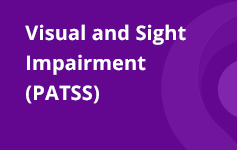Visual Impairment Team
The Visual Impairment (VI) Team provide support and advice for children and young people whose sight loss cannot be fully corrected by glasses or contact lenses. Visual impairments range from mild to profound and children and young people may be registered as sight impaired (partially sighted) or severely sight impaired (educationally blind).
Contacts details
26 West Hoe Road
PL1 3BJ
How we can help you
- Advice to families and carers, early years settings, and schools (including specialist provision) about practical and educational implications of the child's or young person's visual impairment
- Practical and/or emotional support for families
- Guidance on access to the curriculum (including the sensory/experiential curriculum)
- Assess functional vision
- Direct teaching and training for parents and other professionals
- Support the development of independence skills and the social and emotional well-being of a child/young person
- Monitor progress and contribute to target setting
- Involvement in early identification and assessment of children and young people with visual impairment in accordance with the SEND code of practice
- alternative methods of access for example, providing braille or modified resources
- Mobility and living skills (Habilitation) assessment and training
- Peer awareness training
- Advice about accessing specialist resources (enlarged books, touch typing programmes, writing slopes, access technology)
- Environmental access advice on improving visual accessibility
- One-off advice following assessment where the child or young person doesn't meet the criteria for on-going support
- Signposting to other organisations (including on-going liaison with relevant organisations and running joint events as appropriate)
- Enhanced support for pupils/families/schools at key times (transition)
- Registration of visual impairment visits
We work closely with the following organisations and professionals:
- Royal Eye Infirmary
- Other health professionals, for example, paediatricians
- SENCos (Special Educational Needs Coordinators) and Inclusion Leaders
- Teaching and support staff in schools and settings
- Speech and Language therapists
- Educational Psychologists
- Other SEND professionals
- Volunteers (for example, RNIB, Moorvision)
- Paediatricians
- Adult rehabilitation teams
- Sensory Solutions
Training offer and support
We offer training courses for parents, teachers, teaching assistants and other professionals. For more information and a copy of our latest training calendar, contact louise.woodhead@plymouth.gov.uk.
How to request support
To access our services, a Request for More Help form will need to be completed. For education settings, this usually follows a consultation between the PATSS link person assigned to the school and the Special Educational Needs Coordinator at the school.
Download and complete the Request for More Help form (PDF) [361KB]
Once completed, the Request for More Help form must be sent via email to AccessEarlyHelp@plymouth.gov.uk
It is essential that the Request for More Help form reflect the steps already taken, following a Graduated Approach to Inclusion.
We might not accept the request if there is insufficient evidence of needs and steps already taken.
Plymouth also has an Early Help and SEND Advice Line through which you can book a conversation with a Family Support Worker to talk about any worries or questions you may have.
Further reading and resources
Resources for parents and carers
- Latest newsletter (PDF, 813 KB)
- Plymouth VI Network Booklet (PDF, 1 MB)
- Role of the QTVI (PDF, 77 KB)
- Telling Stories Through Touch (PDF, 145 KB)
- Your Future Your Choice (PDF, 1 MB)
- CFVI - a guide for parents (PDF, 1 MB)
Resources for schools and settings
- Latest newsletter (PDF, 813 KB)
- RNIB Access to Education (PDF, 259 KB)
- VI Friendly Classrooms (PDF, 83 KB)
- NatSIP Guidance for Support Staff (PDF, 414 KB)
- Choosing Books (PDF, 430 KB)
- CFVI Framework (PDF, 1 MB)
Useful links
- RNIB
- Guide Dogs
- Nystagmus Network
- The Way We See It - YouTube
- Positive Eye
- RNIB Bookshare
- CustomEyes
- Thomas Pocklington Trust
- Look
Let us know if the information on this page is wrong and needs to be updated. Want to create a page on the Plymouth Online Directory? Register for free and add a page; it only takes a few minutes.Is the information correct?
Plymouth uses an orange 'Local Offer icon' to show services that define themselves as suitable for children and young people with SEND. These are part of Plymouth's SEND Local Offer. We recommend that you contact the service provider to make sure the service is suitable for your child or young person.
- 0 to 1 years old
- 1 to 2 years old
- 2 to 3 years old
- 3 to 4 years old
- 4 to 5 years old
- 5 to 11 years old
- 12 to 16 years old
- 17 to 25 years old
- Visual impairments
Back to search





